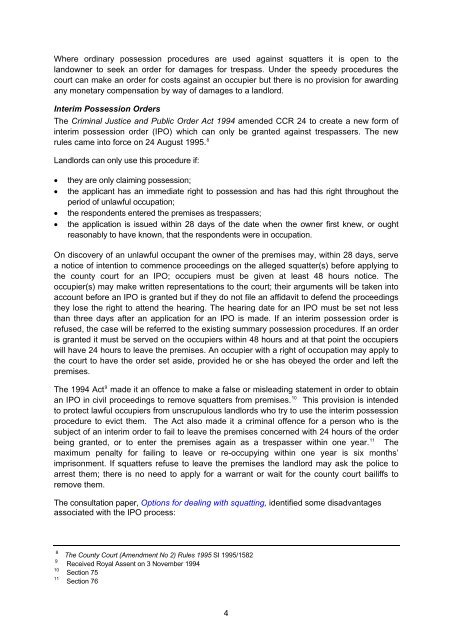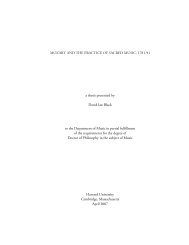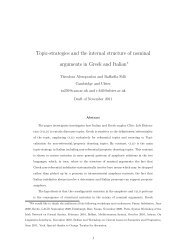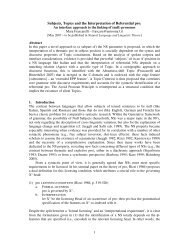Squatting in residential premises
Squatting in residential premises
Squatting in residential premises
Create successful ePaper yourself
Turn your PDF publications into a flip-book with our unique Google optimized e-Paper software.
Where ord<strong>in</strong>ary possession procedures are used aga<strong>in</strong>st squatters it is open to the<br />
landowner to seek an order for damages for trespass. Under the speedy procedures the<br />
court can make an order for costs aga<strong>in</strong>st an occupier but there is no provision for award<strong>in</strong>g<br />
any monetary compensation by way of damages to a landlord.<br />
Interim Possession Orders<br />
The Crim<strong>in</strong>al Justice and Public Order Act 1994 amended CCR 24 to create a new form of<br />
<strong>in</strong>terim possession order (IPO) which can only be granted aga<strong>in</strong>st trespassers. The new<br />
rules came <strong>in</strong>to force on 24 August 1995. 8<br />
Landlords can only use this procedure if:<br />
• they are only claim<strong>in</strong>g possession;<br />
• the applicant has an immediate right to possession and has had this right throughout the<br />
period of unlawful occupation;<br />
• the respondents entered the <strong>premises</strong> as trespassers;<br />
• the application is issued with<strong>in</strong> 28 days of the date when the owner first knew, or ought<br />
reasonably to have known, that the respondents were <strong>in</strong> occupation.<br />
On discovery of an unlawful occupant the owner of the <strong>premises</strong> may, with<strong>in</strong> 28 days, serve<br />
a notice of <strong>in</strong>tention to commence proceed<strong>in</strong>gs on the alleged squatter(s) before apply<strong>in</strong>g to<br />
the county court for an IPO; occupiers must be given at least 48 hours notice. The<br />
occupier(s) may make written representations to the court; their arguments will be taken <strong>in</strong>to<br />
account before an IPO is granted but if they do not file an affidavit to defend the proceed<strong>in</strong>gs<br />
they lose the right to attend the hear<strong>in</strong>g. The hear<strong>in</strong>g date for an IPO must be set not less<br />
than three days after an application for an IPO is made. If an <strong>in</strong>terim possession order is<br />
refused, the case will be referred to the exist<strong>in</strong>g summary possession procedures. If an order<br />
is granted it must be served on the occupiers with<strong>in</strong> 48 hours and at that po<strong>in</strong>t the occupiers<br />
will have 24 hours to leave the <strong>premises</strong>. An occupier with a right of occupation may apply to<br />
the court to have the order set aside, provided he or she has obeyed the order and left the<br />
<strong>premises</strong>.<br />
The 1994 Act 9 made it an offence to make a false or mislead<strong>in</strong>g statement <strong>in</strong> order to obta<strong>in</strong><br />
an IPO <strong>in</strong> civil proceed<strong>in</strong>gs to remove squatters from <strong>premises</strong>. 10 This provision is <strong>in</strong>tended<br />
to protect lawful occupiers from unscrupulous landlords who try to use the <strong>in</strong>terim possession<br />
procedure to evict them. The Act also made it a crim<strong>in</strong>al offence for a person who is the<br />
subject of an <strong>in</strong>terim order to fail to leave the <strong>premises</strong> concerned with 24 hours of the order<br />
be<strong>in</strong>g granted, or to enter the <strong>premises</strong> aga<strong>in</strong> as a trespasser with<strong>in</strong> one year. 11 The<br />
maximum penalty for fail<strong>in</strong>g to leave or re-occupy<strong>in</strong>g with<strong>in</strong> one year is six months’<br />
imprisonment. If squatters refuse to leave the <strong>premises</strong> the landlord may ask the police to<br />
arrest them; there is no need to apply for a warrant or wait for the county court bailiffs to<br />
remove them.<br />
The consultation paper, Options for deal<strong>in</strong>g with squatt<strong>in</strong>g, identified some disadvantages<br />
associated with the IPO process:<br />
8 The County Court (Amendment No 2) Rules 1995 SI 1995/1582<br />
9 Received Royal Assent on 3 November 1994<br />
10 Section 75<br />
11 Section 76<br />
4
















